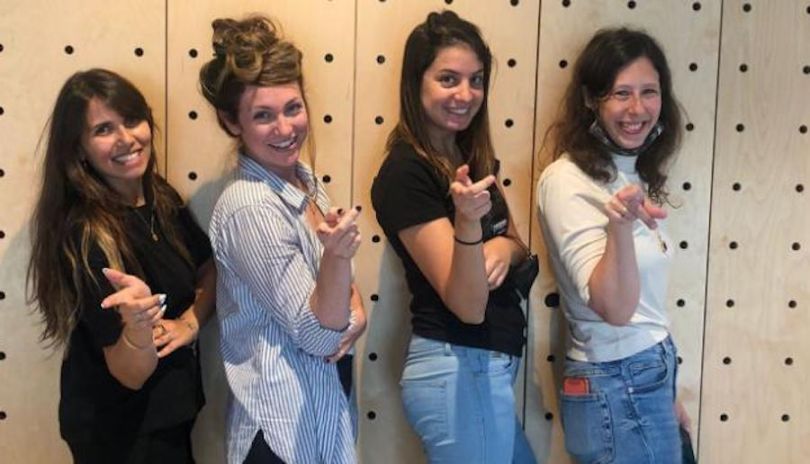Putting people first looks different at different companies.
At Wix, being people-first means placing a major focus on developing leaders who are humane and act with compassion and empathy. For Prospera it’s about inspiration, with employees encouraged to share their passion with the team. AppSumo prioritizes acting quickly on feedback; the company launched a leadership training program one month after managers expressed interest in the idea.
Austin is full of companies that put their people first, and we recently spoke with employees at 12 of them. They told us what that means for their teams, cultures and perks and benefits packages.
Wix’s is platform that allows individuals and businesses to build websites with more than 500 customizable templates.
What steps has Wix taken to foster a people-first culture?
Studies show bad managers are a big reason people leave their jobs. To be proactive, Wix puts a lot of focus and attention on identifying and developing leaders on our team. Our people-first culture is the cornerstone of this approach. Beyond the tactical aspects of the job, we help leaders learn how to be compassionate, empathetic and humane. It’s “the Wix way.” For example, during one of the busiest times of the year for us, our user base was growing faster than we could support and we all felt the pressure. With everything exploding at the seams, we worried an upcoming all-hands call would be difficult.
Our CEO spent the first 15 minutes addressing the hyper growth and acknowledged the pressure we were under. He then doubled down on our values of open communication, feedback and supporting one another, ending the call with a reminder that we are a people company before we are a product company. In a world that’s obsessed with bottom lines, this made a huge impact and showed us what great and compassionate leadership looks like.
What perks, benefits or other offerings help support a people-first company culture?
Some of our notable benefits are biweekly meal allowances through Benepass, 100 percent health insurance coverage, generous PTO and sick days, mental health resources and internal mobility tools. However, I think what really shows that Wix is a people-first company is how we show up for our employees in times of need.
A lot of our employees lost power and water during the Austin ice storms. We called and checked in on our employees, offering hotels, transportation and anything else they needed. Our people and ops teams worked together to get supplies to affected employees. We shipped water and care packages to the area and hired services like TaskRabbit to hand-deliver them to our employees so that they and their families could be safe while they waited it out. This is just one of many examples of how Wix goes above and beyond to take care of our own.
How do you gauge the effectiveness of these efforts and ensure employees feel valued and supported? And what are some ways you’ve adapted your strategy in response?
We don’t rely on annual performance reviews or employee surveys because we feel they can be too impersonal and sometimes a little too late. Instead, we carve out space and time to regularly connect one on one. During these conversations, we talk about performance and encourage honest and open feedback. Our goal is to make these discussions meaningful and ensure each person feels seen and heard, has a sense of purpose and understands how they’re connected to the bigger picture. These moments of feedback give us a better pulse of what matters to our people and spark ideas around what we can do to make things better.
Giving employees more flexibility in their work, restructuring our customer care team so individuals specialize in a domain and feel a better sense of impact and ownership, and connecting team members to growth opportunities are a few of the things that have come out of these conversations. We’re always adapting our strategy so we can offer real solutions in real time.
Gotransverse’s cloud billing software is designed to make it easier for companies to roll out subscription billing.
What steps has Gotransverse taken to foster a people-first culture?
Throughout my time at Gotransverse, managers have always respected employees’ personal time. Whenever someone is sick or has a sick family member who requires care, they are told “family first.” Especially now as we all are living through a pandemic, leadership supports us 100 percent, no questions asked. And if someone has personal needs in the office, they are always addressed.
Last year we partnered with Make-A-Wish central and south Texas to host the 11th annual “Over the Edge” event. The first 150 people on our team to raise $1,500 apiece got the opportunity to rappel down the side of 600 Congress Street, one of the tallest buildings in Austin. Every year more than 550 children in south and central Texas are diagnosed with life-threatening conditions. This event allowed us to give back and raise money and support for granting wishes to critically ill children.
What perks, benefits or other offerings help support a people-first company culture?
We offer several perks that are hands down some of the best I’ve ever seen, including our health care plan and unlimited time off. As soon as you walk into our office you really feel like you are in the music capital of the world. We have decades of rock ’n’ roll posters covering our walls right in the heart and soul of downtown Austin, Texas.
At Gotransverse, we pride ourselves on our company culture, and building company culture starts with the right ingredients. For us, that is our people and our environment. We don’t hire “yes people.” We hire the finest talent in the industry who can take direction and teach us a better way to do things, and our leaders lead by example.
How do you gauge the effectiveness of these efforts and ensure employees feel valued and supported?
One of the things that really stands out is the level of commitment and recognition from the top down. Our employee satisfaction questionnaires are designed to gauge the relative importance of the benefits we offer, and we alter our offerings based on these responses and within budget constraints.
Recognizing the achievements of others is an extremely important element within our culture, too. We kick off our weekly standup meetings by giving kudos to our peers, highlighting those who go above and beyond. Hard work and accomplishments are acknowledged right away and many are nominated for our employee of the month award. The winner receives Amazon gift cards, thank-you notes and bragging rights. Bottom line: we all know we are valued members of the team!

BluePallet’s B2B platform manages the purchase and sale of chemicals from end to end.
What steps has BluePallet taken to foster a people-first culture?
People are the core of our values and we practice what we preach. The most important aspect of centering our people is a leadership team who values candid communication about everything from the state of the business to the importance of taking mental health days. Whether it is an employee’s first day or they are a founding team member, they are empowered to share their feedback through surveys, in meetings and during regular one-on-ones with their direct manager. These regularly scheduled check-ins allow our leaders to assess the temperature of the employee experience by opening the floor for feedback through a series of questions.
These meetings are prioritized as highly as any other operational meeting would be. Due to the distributed nature of our company, we ensure that communication is intentional and consistent. Newsletters, virtual hangouts and all-hands calls are just a few of the ways we make sure our team stays connected. We also enjoy “Pallet Panels,” virtual events where a member of our team or a third party can teach us all about something that they are an expert in, whether it be mindfulness or the future of blockchain tech.
What perks, benefits or other offerings help support a people-first company culture?
Our unlimited paid time off exists to be utilized. Unlike many organizations that offer this benefit, we track time off so that we can nudge team members who haven’t taken any time for themselves in a while. Whether an employee is requesting a week or two off or that we add a holiday to our company calendar, we approve that request with no questions asked. In addition to our flexible time-off policy, we offer a robust suite of benefits, including full medical coverage for employees and monthly stipends for wellness, phone plans and home office equipment.
Our work at BluePallet is monumental, but none of it matters if our team is burnt out, unhappy or feeling unsupported. While our company formed at the height of Covid-19 and it took some time for us to finally meet in person, we had our first company retreat in November of 2021 and connected in person over dinners and at the beach. We plan to host two such trips every year so that we all have the opportunity to enjoy each other’s company, connect in a meaningful way and celebrate our progress.
How do you gauge the effectiveness of these efforts and ensure employees feel valued and supported?
Communication and the employee experience are ever-evolving aspects of business at BluePallet. When an employee shares feedback, it’s immediately documented as an open item. Our operations team holds regular meetings with Brian, our president, to discuss this feedback, and we do not move on until each piece is addressed and resolved. We regard our internal culture more than we do our sales numbers or our open Jira tickets. We also acknowledge that when it comes to communication and support systems, there is no one-size-fits-all solution. Our department leads are given the freedom to alter meeting schedules and feedback processes as much as they see fit to support their direct reports.
It is not unusual to receive a phone call from our CEO, who takes personal responsibility to ensure that every member of our team has balance and direction. Scott also meets with prospective employees before they join and ensures that our North Star is well-communicated and exciting for everyone involved. Through consistent feedback loops, communication and keeping our moxie high, we will achieve all of our goals and have a blast while doing it.

Invicti is a cybersecurity company whose products are designed to keep web apps safe via automated threat detection.
What steps has Invicti taken to foster a people-first culture?
Prior to the pandemic, our U.S. team was heavily oriented around an in-office environment and we were really proud of the culture we built together. Our company was — and still is — in a high-growth stage and the energy and tone within our team was deeply reflective of our core values. And because we were already so oriented to a people-first philosophy, it was without hesitation that leadership advocated for us to quickly pivot to remote work in order to keep our team safe and secure.
Like so many other companies, we thought it would be short term. But while we were waiting for “normal” to return, we doubled in size and expanded our U.S. team to almost 20 states! Through it all, we have continued to affirm the values and connections that have driven us to such great success. We’ve prioritized staying connected by fostering a vibrant online culture, collaborating in person when possible and keeping it real about the pressures associated with the blurring of personal and professional space and time. No one bats an eye when a coworker has to jump out of a Zoom meeting to help their child with school, when dogs bark or real life happens. Authenticity rules the day.
What perks, benefits or other offerings help support a people-first company culture?
In 2021 we launched a monthly employee wellness initiative called “Invicti Thrive” that allowed our global team to socially interact and support each other around subjects like mindfulness, cooking, fitness, arts and music, pets and family, humor, turns out dad jokes are cross-cultural in their agonizing awesomeness; gardening and philanthropy. It was one of many ways we’ve tried to keep the experience of being human at the forefront of our work together.
We also give our teams flexibility and autonomy to work in the way that works for them. For some teams that means “no meeting Wednesdays,” for others it’s time blocks for wellness activities and the freedom to work where they’ll be most productive. By providing that autonomy we’re showing our employees that we trust them, which helps foster that people-first culture.
How do you gauge the effectiveness of these efforts and ensure employees feel valued and supported?
We listen, the most important thing you can do on top of giving your team a voice. We asked our employees for feedback on our benefits and wellness initiatives, and we’re enhancing our 2022 programs to provide global offerings that support them no matter where they are based.
Although previously we had perks and benefits customized based on employee location, we’ve since created global programs based on feedback to support our employees no matter where they’re based. That means they get the same benefits regardless of where they reside. We’re also keeping an eye toward the continuing impacts of the pandemic on mental and emotional health and are ready to offer support where we see that our employees need it.

Prospera uses machine learning and computer vision to help make farming more predictable and to enable farmers to make decisions based on data as opposed to instinct alone.
What steps has Prospera taken to foster a people-first culture?
For us, putting people first is the ability to grow through inspiring one another. We have knowledge-sharing sessions on whatever subjects we fancy and create a special growth plan for each employee that is revisited and adjusted quarterly. We hold one-on-one meetings with employees to discuss their professional development at the company, pointing out the target and how to get there.
We were acquired in May of 2021, an exciting achievement that enabled us to bring people closer together while emphasizing our one big cross-continent culture. Our virtual space grew with some enriching meetings about global culture, and employees created sessions about their teams during this exciting journey. Throughout this period, we kept our core values of resourcefulness, challenging everything respectfully, teamwork and growth intact.
What perks, benefits or other offerings help support a people-first company culture?
We always make sure to back up our words with actions! We conduct a monthly sync session where we celebrate birthdays over cake. We also celebrate employee anniversaries. We send out a warm soup when someone is ill and accompanied by a treat or a game for their children.
In addition, we have many global and local events, including at least two big vacations and parties a year. We have found that if we know each other and can connect, our success is much sweeter, which is why we encourage teams to throw their own event every quarter.
How do you gauge the effectiveness of these efforts and ensure employees feel valued and supported?
We conduct employee surveys that focus on the daily office routine and additional activities and ideas. We are always looking for employee feedback — including anonymous feedback — and we back it up with personal sessions accordingly. We track our data to be able to point out internal trends and required changes, such as our hybrid work model, which we’ve kept flexible as a result of employee feedback. We also track and seek to maintain our low attrition rate. We research and we act.

Contractors, landscapers, plumbers and more use RealWork Labs’ app to bring their marketing efforts out of the office and onto the job site.
What steps has RealWork Labs taken to foster a people-first culture?
RealWork Labs’ first value is “people first.” We recognize that employees are people inside and outside of their jobs and strive to support them so they can be successful in all facets of life. No one works for RealWork Labs; people work with RealWork Labs. We take that difference seriously.
Our employees have shown gratitude and appreciation for our empathy, flexibility and our free employee assistance program (EAP). Recently, an employee experienced the tragic loss of a close friend. We extended time off and offered different grief and loss resources like local groups, counselors and our free EAP.
What perks, benefits or other offerings help support a people-first company culture?
We recognize that new parents need more than 12 to 14 weeks to bond with their child, and we offer 20 weeks of paid leave to primary parents and 16 weeks of paid leave to secondary parents.
In addition, every RealWork Labs employee fills out an employee profile so that we know how they like to be recognized and what we can do to show them they are valued. These profiles indicate if someone likes public or private recognition and how they like to be rewarded for their hard work. For example, if someone says that they like to be recognized privately and enjoy going to the movies on the weekends, we can send them a thank-you note and gift card to Alamo Drafthouse.
How do you gauge the effectiveness of these efforts and ensure employees feel valued and supported?
To ensure employees feel valued and supported, we have a monthly all-hands where we spotlight and call out specific employees who are making an impact. We encourage people to submit questions for the Q&A portion of the all-hands and send out monthly engagement surveys asking for feedback regarding our benefits, office culture, management and recognition systems. We also have required biweekly one-one-ones with direct reports to ensure they are getting the development and support they need.
Aristocrat is a global gaming company thats offerings include electronic gaming machines, casino management systems and mobile games.
What steps has Aristocrat taken to foster a people-first culture?
To us, the question isn’t why we need a people-first culture but rather how we can continue to achieve it. It starts by understanding who can make the greatest impact. Outside of our people and culture partners, our business managers have the greatest ability to create and maintain our culture. It has become imperative that our leadership teams are able to walk the talk when it comes to our company culture and values.
This type of alignment has allowed employees to feel the impact of our people-first culture and attracts like-minded talent to our organization. Aristocrat has also invested in technology platforms to support and assist with mentoring, employee recognition, continued learning and employee feedback. These programs allow employees to be recognized for the amazing things they accomplish daily for our organization.
Our global employee recognition program, Power Plays, gives employees the opportunity to recognize people who demonstrate our values, model our behaviors and help achieve our shared mission. Team members send e-cards and nominate each other for rewards. We concentrate on our employees and allow their satisfaction and engagement to drive our company performance forward.
What perks, benefits or other offerings help support a people-first company culture?
Even though the last several years have drastically changed our culture, we have been able to find new ways to put our employees first. On November 1, 2021, we launched an “all flex” working model. This flexible hybrid working model provides people with more choices about where, when and how they work. This benefit encourages flexibility at work and seeks to accommodate employees’ preferences whenever possible while meeting business requirements and providing high-energy workspaces that foster collaboration.
As an organization, Aristocrat places a huge importance on employees’ mental health and well-being. There are links to internal and external resources on our internal company website to help navigate the ever-changing environment that we live in and that help employees focus on their well-being relating to mental and physical health, community, career and social. Our global employee support fund offers financial assistance to employees who have experienced an unforeseen life-changing financial hardship. This is another example of how Aristocrat was able to adapt and listen to what our employees needed during such a difficult time.
How do you gauge the effectiveness of these efforts and ensure employees feel valued and supported?
We have constant check-ins and conversations to make sure that our employees are feeling valued and supported, and we put people who have a clear understanding of our values and people-first culture in leadership positions. This trickle-down effect allows for employees at all levels to feel heard and supported, which in turn allows Aristocrat to keep a constant pulse on the effectiveness of our efforts. Through quarterly pulse surveys, all employees can share their thoughts, feelings and overall engagement with leadership confidentially. These results are not only a great way to gauge the effectiveness of our efforts but also open up areas of opportunity for us to improve based on what interests our people.
We are constantly adapting and updating our strategy based on what our employees are saying. For example, we are updating our mentoring program to be more inclusive and incorporate not only Aristocrat employees but our subsidiaries in other countries. The new mentoring platform allows for employees to connect with multiple mentoring opportunities and provides guidelines and information to help support mentoring relationships long term. If you can create a great place to work, then great work will take place!
AppSumo operates a marketplace where entrepreneurs can find discount deals on a wide variety of business software.
What steps has AppSumo taken to foster a people-first culture?
We have worked hard to establish a genuine culture that promotes feedback, and our leadership team listens to what is important to our people. For example, we heard from our managers that they were hungry for leadership training. Within one month we researched options, vetted them with a pilot group and launched yearlong self-paced development programs for our managers. And that’s just one example! We act that fast here and reshuffle priorities to support our people.
What perks, benefits or other offerings help support a people-first company culture?
For starters, we take work hard, play hard to another level with company-sponsored trips twice a year. We’ve gone to Costa Rica and Hawaii several times and take a “keep the lights on approach” so we can unwind a little and focus on bonding.
Next are our twice monthly town halls, which are anything but traditional. Our CEO takes knowing every teammate to a whole new level. As an example, in our first town hall of 2022 he carved out time for us to share work and/or personal goals to foster natural mentorship and partnerships with each other. The best part? It wasn’t planned and happened in the moment. He changed direction instantly because he genuinely wanted to know more about the team.
Finally, there’s our benefits. When we say take care of yourself, we mean it. We offer each full-time teammate fully paid medical, dental, vision and a $50,000 life insurance policy. That paired with an unlimited PTO policy shows how we care about our teammates as people.
How do you gauge the effectiveness of these efforts and ensure employees feel valued and supported?
We send our anonymous NPS survey out quarterly to broadly gauge the level of joy our teammates feel at work. We believe people who feel connected in different areas of their workselves are those who want to bring their whole selves to work every day. We are partners in their work joy and take that partnership very seriously. We share anonymous results companywide and include how we’re going to use that feedback to make AppSumo an even better place to work. Since we don’t see each other daily anymore, we need this feedback more than ever.
Second, we foster a feedback-centric environment. We encourage all teammates to share feedback in the moment as much as possible through various channels. Feedback is not viewed negatively and no one shies away from constructive criticism. We have management training in place to help foster this approach at all levels. Giving and receiving feedback is not easy for a lot of people, and we continuously seek out training and development approaches to support these skills throughout the company.
Care.com operates a two-sided marketplace where people can sign up to provide care to senior citizens, children and pets or source local caregivers for their family members.
What steps has Care.com taken to foster a people-first culture?
I often see organizations trying to recreate the culture they had in place prior to the pandemic, but it is less about how you are recreating your culture and more about how you are redefining it. Care.com has always been a people-first organization. While our pre-pandemic culture was heavily defined by in-office perks, such as weekly happy hours, reinventing our culture to meet our employees where they were at in life — the majority were remote— required our utmost focus.
To do this, we went to our team members directly with live interviews and anonymous surveys to ask them how we could continue to be a best-in-class workplace. Unsurprisingly, we found that in-office perks no longer resonated with our people. So, we conducted an audit to determine places we can reallocate funds in more meaningful ways. For Thanksgiving we sent brownies to our employees, with the proceeds helping homeless individuals rejoin the workforce. This was well-received across the company and we plan to do more initiatives like it this year.
What perks, benefits or other offerings help support a people-first company culture?
We believe in fostering a workplace culture that accommodates team members across the full life spectrum, whether they’re just joining the workforce, welcoming a baby to the family or planning for retirement. We do this by meeting our team members where they are in life. For career beginners we’ve developed a robust and proprietary leadership development program to help them go from a leader of self all the way to an executive. For new parents, we offer highly valued benefits like 16 weeks of fully paid paternity leave and expensed takeout meals within the first three months after the baby is born. For retirement planners, we offer a very competitive 401(k) match program.
We also recognize the importance of delivering benefits and perks that can be utilized and enjoyed by team members of all ages and stages. These include mental health resources like Headspace, companywide activities like live competitions and virtual murder mystery parties, and fun kits mailed to our employees’ homes that contain items for hosting dinner parties.
How do you gauge the effectiveness of these efforts and ensure employees feel valued and supported?
Our people operations team measures effectiveness by placing a great deal of value in employee feedback, engagement scores and idea generation. As a fast-paced consumer technology company, we strongly believe in testing and iterating. We are consistently soliciting the opinions of our employees through live interviews and anonymous surveys where we highly encourage honesty and candidness.
We also place a high level of accountability on our managers. It is our responsibility to ensure that managers stay abreast of the best ways to support and value their team members to keep them fully engaged. We recognize that this starts — and can stop — at a manager’s ability to effectively lead their team, which is why we invest in the continued education of our managers on topics such as leadership strategies.

Self Financial works to help people build and repair their credit through an app-based credit builder loan, with users paying into the loan monthly and receiving their funds after all payments are completed.
What steps has Self Financial taken to foster a people-first culture?
First, we understand our shared purpose and are closely tied to our mission to increase economic inclusion and financial resilience by empowering people to build credit while building savings. Leadership reiterates this message in weekly companywide meetings and shares progress toward quarterly goals while recognizing each team’s unique contribution.
Second, we ask our employees to express themselves. We foster a culture where people are encouraged to be themselves and express ideas, and we take action based on their input. We gather feedback from anonymous employee surveys and establish action teams to tackle key initiatives raised in them.
Third, we build a culture of inclusion and growth. Our formal career development and coaching programs foster direct conversations between employees and managers, while mentoring and job shadowing make people aware of other opportunities within the company. We encourage diversity and empower employees through our employee resource groups. We also provide opportunities for education and awareness in all of our internal programs.
What perks, benefits or other offerings help support a people-first company culture?
Self’s employee benefits programs are designed to support the wellbeing of our teams and their families. We offer three full-coverage health plans and two dental plans. Flexible PTO allows employees to take time off from work or to take personal time for volunteering, school events and other commitments. From our employee assistance program to paid parental leave — up to 12 weeks for birth or adoption — and wellness programs, our approach is to provide a wide range of benefits. We also give our employees the option of working in a hybrid or remote setup.
How do you gauge the effectiveness of these efforts and ensure employees feel valued and supported?
We are a data-driven company and rely on data and feedback from employees as well as subjective evaluations to help us understand employee sentiments and the cause and effect between HR programs and employee happiness. Management is very transparent when it comes to top-down communication and expects the same from employees. We ask for direct feedback through our anonymous feedback tool and through regular one-on-ones, skip-level conversations and team retrospectives. We also have an open-door policy and our CEO does a one-month touch base with new employees.
We conduct DEI and employee engagement surveys twice a year. In an anonymous survey completed by 96.4 percent of employees in November 2021, 94 percent said they are proud to work at Self. A total of 90 percent said they would recommend Self as a great place to work. Finally, 86 percent said they agree that their managers are great role models. Self continues to grow. To help us continue to stay in touch, we will introduce Kazoo, a new employee recognition tool.

Engagency specializes in building enterprise-level websites using Sitecore and Optimizely.
What steps has Engagency taken to foster a people-first culture?
For us, it began with intention. We wrote out our cultural mission statement and put it directly in our job descriptions, and that drew in like-minded people who valued culture over everything else. From there we started thinking about how to nurture people and their basic needs during the day. We realized that we built a team of introverted workaholics and so we started providing lunch every day and sitting together to build community. Then we started hosting all kinds of fun events.
What perks, benefits or other offerings help support a people-first company culture?
The benefits that we provide really reflect our values in terms of supporting the whole person. For example, in addition to paying 100 percent of each employee’s healthcare premiums, we also pay for national and state park passes and encourage people to get out and have fun.
How do you gauge the effectiveness of these efforts and ensure employees feel valued and supported?
Open dialogue. We have an HR team that conducts anonymous interviews and solicits feedback. It’s a really helpful exercise and it gives us valuable insight into how we can improve and how pleased everyone is with the environment we’ve created together.
Overhaul provides companies with products designed to mitigate and manage supply chain risks.
What steps has Overhaul taken to foster a people-first culture?
We build initiatives and programs from our culture code, which is anchored in evidence-based approaches of how to best support the holistic nature of people. For example, we have a commitment to wellness. Thus, we have anchored a program in this commitment called BAMM, or body and mind movement. BAMM is blocked daily on every employee’s calendar, and people BAMM by stepping away from their computers and phones to walk, run, meditate, do yoga and more.
We are also currently rolling out a strengths-based approach to how we work. This approach is significantly correlated to people feeling less worried, more engaged and happier at work. It is amazing to observe the team as they have their own strengths revealed to them and validated in the way we work together.
What perks, benefits or other offerings help support a people-first company culture?
People-first is about every aspect of the way you support and lead every person in your organization, and benefits are a key aspect of this. We’ve offered fully-paid comprehensive medical and mental health options for employees, their spouses and partners, and dependents since we started Overhaul.
We also have a boosted employee assistance program that includes a wealth of health and life services, like direct access to mental health practitioners, nurses, attorneys, financial professionals, dependent care specialists and a library of community resource information. Additionally, we host a “food for thought” series where we hold companywide sessions to discuss topics such as burnout, nutrition, completing stress cycles, mental health stigmas, and more.
How do you gauge the effectiveness of these efforts and ensure employees feel valued and supported?
We distribute anonymous surveys quarterly that are specifically designed to get an in-depth pulse on how our employees are doing and what we need to do to better support them. The surveys collect information specifically around constructs such as rest, goal support, shared values, psychological safety, meaning, professional development, trust, purpose and utilization.
Our newest strengths-based initiative is rooted in the team’s feedback from this survey as team members indicated that they were eager to leverage more of their strengths at work. We also have this specific commitment in our culture code, so we started a 2022 initiative around it!




























